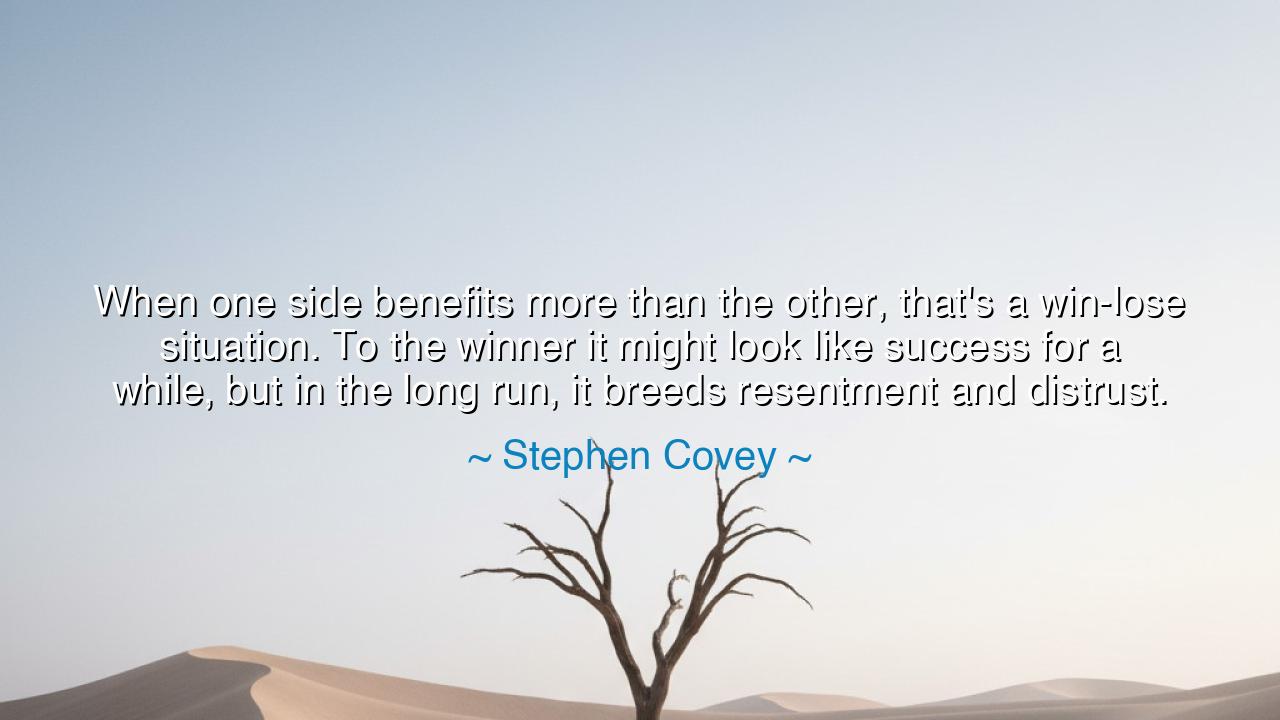
When one side benefits more than the other, that's a win-lose
When one side benefits more than the other, that's a win-lose situation. To the winner it might look like success for a while, but in the long run, it breeds resentment and distrust.






The words of Stephen Covey strike like a chisel upon stone: “When one side benefits more than the other, that’s a win-lose situation. To the winner it might look like success for a while, but in the long run, it breeds resentment and distrust.” Here is a truth as old as human struggle—that victory built on another’s loss is never lasting. Win-lose success is but a mirage: it glitters for a moment, yet beneath the surface lies poison, slowly seeping into the bond between people, communities, or nations.
The ancients knew this well. In their stories, the gods often punished arrogance and greed. When one sought to prosper at the expense of another, disharmony followed. Consider the legend of Cain and Abel: Cain saw his brother’s offering favored and chose envy and violence rather than partnership. For a brief instant, Cain felt power, a grim “victory.” But what followed was exile, loneliness, and the eternal curse of distrust. So it is in every age: the illusion of success achieved through another’s pain becomes the seed of resentment.
History offers many examples. Consider the Treaty of Versailles after the First World War. One side, the victors, demanded reparations so heavy that Germany was left humiliated and broken. For the victors, it seemed like triumph, a win-lose arrangement ensuring dominance. Yet resentment grew like fire beneath the ashes, until it erupted again in a second, even more terrible war. What appeared success was only the planting of distrust and destruction. Covey’s words echo with this warning: victory without fairness cannot endure.
But the reverse is also true: when both sides share in the benefit, when fairness and respect shape an agreement, trust flourishes, and success multiplies. Consider the story of Abraham Lincoln, who after the Civil War called not for vengeance but for reconciliation. “With malice toward none, with charity for all,” he sought to bind the nation’s wounds by ensuring that one side’s victory did not become the other’s eternal bitterness. Though imperfect, his vision recognized that lasting peace cannot be built on resentment—it must be built on equity and healing.
Covey’s wisdom is not only for nations but for every relationship. In families, when one partner or one child always yields while another always takes, distrust grows. In business, when a leader prospers while workers struggle, bitterness festers. In friendship, when one voice dominates and the other is silenced, the bond decays. For life is not a battlefield of endless winners and losers, but a web of shared destinies. To tear at one thread for selfish gain is to weaken the whole.
O seeker, hear this and hold it fast: the long run reveals all. What seems victory today may tomorrow be revealed as betrayal. Do not measure success by your gain alone, but by the strength of the relationship left behind. If your triumph leaves another in ruin, you have planted not greatness but resentment. But if your triumph uplifts others with you, then trust will grow, and trust is the soil in which enduring success is rooted.
Practical wisdom follows: in every choice, seek fairness. Ask not only, What do I gain? but also, What do we build together? In negotiations, look for solutions where all can stand with dignity. In families and friendships, ensure giving is mutual, not one-sided. In leadership, remember that to exploit is to weaken, but to empower is to strengthen. For trust is more precious than gold, and without it, all victories crumble into dust.
Thus, remember Stephen Covey’s truth: win-lose is not true success, for it breeds resentment and distrust. Seek instead win-win, where all may share, and bonds may grow. For in the end, success that lifts only one is fleeting, but success that lifts many is eternal. Choose the path of fairness, and you will walk in the company of trust, and trust will carry you farther than victory ever could.






AAdministratorAdministrator
Welcome, honored guests. Please leave a comment, we will respond soon